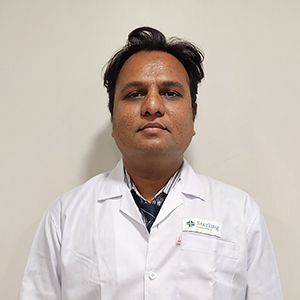Surgical gastroenterology
Surgical gastroenterology is a branch of medicine that deals with the surgical treatment of diseases of the digestive system. This includes the esophagus, stomach, small intestine, large intestine, liver, gallbladder, and pancreas.
Sterling Hospitals Rajkot is a leading hospital that offers a comprehensive range of surgical gastroenterology services. The hospital's team of experienced surgeons is dedicated to providing patients with the highest quality of care.
Surgical gastroenterologists work closely with other healthcare professionals, such as gastroenterologists, radiologists, and oncologists, to provide comprehensive care for patients with digestive system diseases.
The following are some of the conditions that are treated by Sterling Hospitals Rajkot , surgical gastroenterology team:
- Esophageal cancer
-
Gastric cancer
-
Small bowel cancer
-
Large bowel cancer
-
Liver cancer
-
Gallbladder cancer
-
Pancreas cancer
-
Inflammatory bowel disease (IBD)
-
Diverticulitis
-
Hernias
-
Anorectal disorders
-
Peptic ulcers
-
Gastroesophageal reflux disease (GERD)
Here are some of the benefits of surgical gastroenterology:
- They have specialized training in the surgical treatment of digestive system diseases.
-
They are able to perform a wide range of surgical procedures.
-
They work closely with other healthcare professionals to provide comprehensive care.
-
They are up-to-date on the latest advances in surgical gastroenterology.
Treatment Methods
The treatment methods used at Sterling Hospitals Rajkot, surgical gastroenterology department vary depending on the individual patient's condition. Some of the most common treatment methods include:
- Laparoscopic surgery
-
Open surgery
-
Endoscopic procedures
-
Radiation therapy
-
Chemotherapy
- Laparoscopic Surgery
Laparoscopic surgery is a minimally invasive surgical procedure that uses small incisions in the abdomen. This type of surgery is often used to treat a variety of conditions, including hernias, IBD, and GERD.
Open Surgery
Open surgery is a more traditional surgical procedure that involves making a larger incision in the abdomen. This type of surgery is often used to treat more complex conditions, such as cancer.
Endoscopic Procedures
Endoscopic procedures are performed using a thin, flexible tube with a camera attached to the end. This tube is inserted into the body through a small incision. Endoscopic procedures are often used to diagnose and treat conditions such as GERD, peptic ulcers, and colon polyps.
Radiation Therapy
Radiation therapy uses high-energy beams to kill cancer cells. Radiation therapy can be used before or after surgery to treat cancer.
Chemotherapy
Chemotherapy uses drugs to kill cancer cells. Chemotherapy can be used before or after surgery to treat cancer.
Recovery
The recovery time after surgical gastroenterology procedures varies depending on the type of procedure performed. Laparoscopic procedures typically have a shorter recovery time than open surgery.
In general, the recovery process for surgical gastroenterology procedures involves the following steps:
- Immediately after surgery: You will be taken to the recovery room, where you will be monitored by nurses. You may experience some pain and nausea, and you will be given medication to help manage these symptoms.
- First few days after surgery: You will likely stay in the hospital for a few days after surgery. During this time, you will be encouraged to get up and move around as soon as possible. You will also be given instructions on how to care for your incisions.
- Weeks after surgery: You will continue to recover at home. During this time, you should avoid strenuous activity and listen to your body. You should also follow your doctor's instructions on how to care for your incisions.
The following are some tips for a smooth recovery after surgical gastroenterology procedures:
- Get plenty of rest.
-
Eat a healthy diet.
-
Drink plenty of fluids.
-
Take your medications as prescribed.
-
Monitor your incisions for signs of infection.
-
Contact your doctor if you have any concerns.
Most people make a full recovery after surgical gastroenterology procedures.
However, it is important to follow your doctor's instructions carefully to ensure a smooth recovery.
Patient Care
The patient care team at Sterling Hospitals Rajkot, is dedicated to providing patients with the highest quality of care. The team includes nurses, doctors, and other healthcare professionals who are experienced in providing care for patients with surgical gastroenterology conditions.
When do you need a Gastroenterology surgery procedure :
A surgical gastroenterologist will first evaluate your medical condition to determine whether you are a candidate for surgery. If you are experiencing any of the following symptoms, it is important to reach out to a surgical gastroenterologist as soon as possible:
- Difficulty swallowing
-
Chest pain that radiates to your groin
-
Constant abdominal discomfort and vomiting
-
Blood in your vomit
-
Leakage of feces
-
Watery stools
-
Blood in your stools
These symptoms can be signs of a serious underlying condition, and early diagnosis and treatment are essential. A surgical gastroenterologist will be able to assess your symptoms and recommend the best course of treatment, which may include surgery.
Here is a more detailed explanation of each symptom:
- Difficulty swallowing: This can be a sign of a narrowing of the esophagus, which can be caused by a number of conditions, including GERD, cancer, or scarring.
-
Chest pain that radiates to your groin: This can be a sign of a hiatal hernia, which is a condition where part of your stomach pushes up through your diaphragm.
-
Constant abdominal discomfort and vomiting: This can be a sign of a number of conditions, including ulcers, gastritis, or pancreatitis.
-
Blood in your vomit: This can be a sign of a serious condition, such as a bleeding ulcer or cancer.
-
Leakage of feces: This can be a sign of a problem with your bowel control, such as a hernia or a tear in your rectum.
-
Watery stools: This can be a sign of a number of conditions, including infections, celiac disease, or inflammatory bowel disease.
-
Blood in your stools: This can be a sign of a serious condition, such as colon cancer or ulcerative colitis.
If you are experiencing any of these symptoms, it is important to see a doctor right away. Early diagnosis and treatment are essential for the best possible outcome.
Conclusion
Sterling Hospitals Rajkot, is a leading multi-specialty hospital that offers a comprehensive range of surgical gastroenterology services. The hospital's team of experienced surgeons is dedicated to providing patients with the highest quality of care.
If you are experiencing any of the conditions listed above, please schedule an appointment with a surgeon at Sterling Hospitals Ahmedabad. The surgeon will be able to assess your condition and recommend the best course of treatment.











